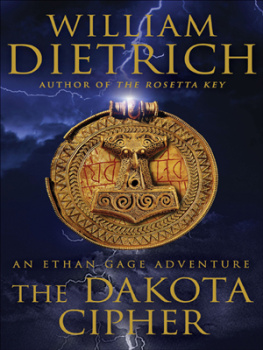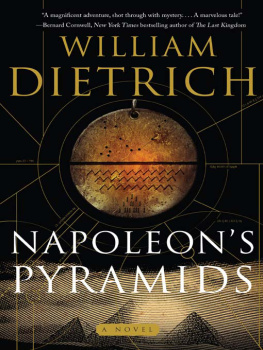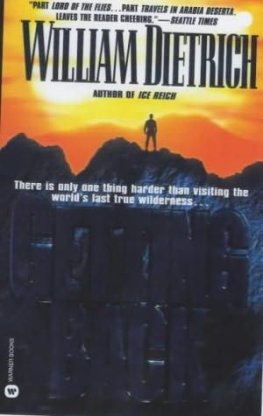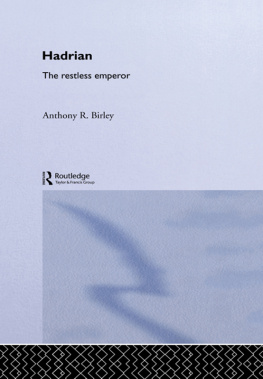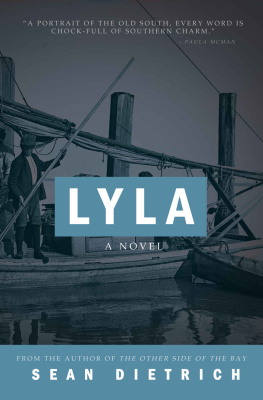William Dietrich - Hadrian's wall
Here you can read online William Dietrich - Hadrian's wall full text of the book (entire story) in english for free. Download pdf and epub, get meaning, cover and reviews about this ebook. genre: Adventure. Description of the work, (preface) as well as reviews are available. Best literature library LitArk.com created for fans of good reading and offers a wide selection of genres:
Romance novel
Science fiction
Adventure
Detective
Science
History
Home and family
Prose
Art
Politics
Computer
Non-fiction
Religion
Business
Children
Humor
Choose a favorite category and find really read worthwhile books. Enjoy immersion in the world of imagination, feel the emotions of the characters or learn something new for yourself, make an fascinating discovery.

- Book:Hadrian's wall
- Author:
- Genre:
- Rating:3 / 5
- Favourites:Add to favourites
- Your mark:
- 60
- 1
- 2
- 3
- 4
- 5
Hadrian's wall: summary, description and annotation
We offer to read an annotation, description, summary or preface (depends on what the author of the book "Hadrian's wall" wrote himself). If you haven't found the necessary information about the book — write in the comments, we will try to find it.
Hadrian's wall — read online for free the complete book (whole text) full work
Below is the text of the book, divided by pages. System saving the place of the last page read, allows you to conveniently read the book "Hadrian's wall" online for free, without having to search again every time where you left off. Put a bookmark, and you can go to the page where you finished reading at any time.
Font size:
Interval:
Bookmark:
William Dietrich
Hadrian's wall
PROLOGUE
The northern wind blew across the ridge with a howl like an army of barbarians.
The metaphor pleased the emperor, who considered himself a scholar as well as a soldier. A new balcony jutted from the wooden quarters that had been hastily erected for the emperor's entourage, and Hadrian stood on it now, adding the gale to his mental inventory of the empire. The long green blades of the grassy ridge that rose before him were combed flat by the weather and sheets of rain lashed his raw fifty-room complex, drumming against timbers still pungent from their cutting and dripping into the rooms below where the braziers were inadequate. The climate clung to one's clothing and drove deep into one's very bones. Rather than dwell on this, it was better to look outward, into the teeth of the wind. A ravine to the right sheltered a stand of trees that crept up the defile like an advancing patrol, and the emperor's tactical eye followed it, noting how bitterly the branches shuddered at the crest. Not a place any man would wish to be stationed, he thought, but then that was true of all borders, wasn't it? By their very nature, borders were where comfort ended. Behind him the corridors of the complex rumbled with the tread of military boots, the sound echoing all the louder for the paucity of furnishings and carpets. Retiring governor Pompeius, Hadrian knew, hadn't had much time to prepare for the imperial arrival. At the emperor's own insistence, the imperial dispatches heralding his approach demanded maps and models, not luxuries. He wouldn't tarry here long.
Yet Hadrian had complimented his host for the ambitious timber construction at lonely Vindolanda. Half his life had been spent under a tent, so this was a relative improvement. "Happiness is tied to expectations, not belongings," he told the officers assembled behind him. "At the empire's edge, we expect less and so take more pleasure in little things."
A legate dutifully wrote the remark down.
"A man of your responsibilities deserves all that we can share," Pompeius replied loyally. The comfort of his own retirement, he knew, depended on the emperor's favor.
"A man of my power could have chosen to stay in Rome, governor. But I didn't, by desire and by necessity. Right, Florus?" The head of his plump poet and jester poked out of an enclosing cloak like an emergent and miserable mole.
"We rejoice to share your burdens, Caesar," Florus said with all the insincerity he could muster. "In fact, a verse about your heroism has just come to me."
The emperor's courtiers smiled in anticipation of some new slyness, and Hadrian's eyebrows mockingly arched. "Really? What a surprise to hear an offer of your wit."
"It comes to me unbidden, sire, a present from the gods. I call my verse 'The Plea of Hadrian.'"
"Then let's hear the god's wisdom, fat Florus."
The poet stood, dropping his cloak with a dramatic flourish and coming chest-high to the centurion beside him. He recited in a high, piping voice:
I don't want to be emperor-please!
To tramp around Britannia, muddy to my knees
Or be stuck in stinking Scythia, watching my purple ass freeze!
Florus bowed and plopped down, burrowing again into his cloak. The visitors roared, even as Pompeius flushed with shock at this sally about the imperial color. No one else seemed surprised at the satire. Hadrian's close companions shared the camaraderie of endless miles, rude quarters, and homesickness. No ruler had ever attempted to tour the entire empire before. A permissible joke kept them all sane.
"Write that down, too," Hadrian instructed the legate, smiling wryly. Then he looked out again at the sodden slope, suddenly impatient. "So let's get muddy to our knees, Romans. Let's see this high ground!"
The ruler was as restless as he was quick. In the last half hour he had dictated three letters, suggested terracing the hills for orchards and pasture to save the commissary money, reviewed and approved the execution of a legionary caught selling a cache of spearheads to the barbarians, and requested for audience that evening a centurion's concubine who had caught his eye. The officer was not wholly discontented with this demand: the woman would get a bauble for her favor, his own chances for promotion would improve, and the emperor would be warm this night and in a better mood tomorrow. In the meantime, Hadrian wanted to climb the hill.
"We could wait on the weather," Pompeius offered cautiously.
"Wait on the weather in Britannia?" The laugh was a bark. "I'm forty-eight years old, governor. Wait on the weather, and I might as well order my tomb."
"It changes quickly, Caesar."
"So does my empire. I've traveled from Persian parch to Briton bog. If I'd waited on weather, I'd still be in Syria, sunburned and bored."
The new governor, Platorius Nepos, had accompanied Hadrian from Germania after being picked as Pompeius's successor and had quickly learned his master's impatience. "I'll order the horses," he said.
"No. We walk." The emperor addressed the assembled officers. "We walk like the barbarians walk, to feel the lay of the land as they do and try to imagine what this proposed line of ours will look like, to them and to us."
The emperor set a brisk pace. He was tall, his face bearded to hide the pits and scars left by the acne that had plagued him as a youth, and he habitually went bareheaded, his dark Iberian hair curling in the rain. His fur-trimmed cloak flapped behind him like a bird's tail as he strode, his hounds dashing excitedly ahead after nothing. Generals, engineers, logisticians, architects, and centurions followed him up the muddy incline like a procession of ants. A few Praetorian cavalry rode ahead in protective screen, but otherwise there was no formality to this survey, and no pomp. Gray clouds scudded across the broad valley to the south, soaking it, while the ridge crest still hid the country to the north.
Pompeius was panting. "I'd expected to show the scale models first."
Nepos grinned. "Those he'll want at midnight. In daylight, he moves. When he ordered a palisade in Germania and Flavius balked at the cost in labor, Hadrian grabbed a spade and ax himself. The legion almost stampeded to get ahead of him. By the time he left, the first mile of log wall was already in place."
"His pace is quick."
"And his mind quicker. He wants to settle the world."
The Praetorians reined in abruptly at the crest. Hadrian paused below it, waiting in the lee of the hill to catch his breath and let the others gather around him. The rain was slackening to a blowing mist. The emperor squinted against it, seemingly immune to the cold. "Our empire stops at the dreariest places," he remarked to the huddled men.
There was dutiful laughter, but some looked uneasy at this confirmation of the rumored halt. "Not under Trajan, it didn't," one centurion muttered. Hadrian's predecessor had been a ceaseless expansionist. Trajan never stopped.
The new emperor, pretending not to hear this remark, turned and led the men up the hillside. At the summit the earth dropped away, and the wind struck them like a slap.
What had been a grassy hill on the south slope ended in an abrupt cliff of dark and rugged volcanic rock on the north. There was a sheer plunge of two hundred feet and then a wasteland of moor and lead-colored pond, undulating northward toward the smoky mists of distant Caledonia. In the pale light it was difficult to tell what was cloud and what was mountain. No matter. The view was magnificent, the rain stung, and the position was unassailable. The soldiers murmured their approval.
"This is the high point of a ridge that extends across much of the waist of Britannia," Pompeius explained. "You can see, Caesar, what a natural boundary it is. Inlets allow a port on both coasts. Flatter ground allows deployment of cavalry to the east and west. A road already runs in the valley behind us. Some forts and watchtowers-"
Font size:
Interval:
Bookmark:
Similar books «Hadrian's wall»
Look at similar books to Hadrian's wall. We have selected literature similar in name and meaning in the hope of providing readers with more options to find new, interesting, not yet read works.
Discussion, reviews of the book Hadrian's wall and just readers' own opinions. Leave your comments, write what you think about the work, its meaning or the main characters. Specify what exactly you liked and what you didn't like, and why you think so.

